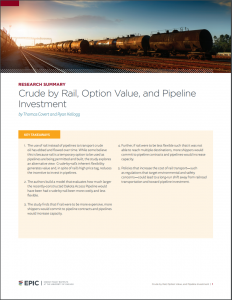Full Title: Research Summary: Crude by Rail, Option Value, and Pipeline Investment
Author(s): Thomas R. Covert & Ryan Kellogg
Publisher(s): Energy Policy Institute at the University of Chicago
Publication Date: September 1, 2017
Full Text: Download Resource
Description (excerpt):
The recent large-scale use of railroads to transport crude oil out of newly discovered shale formations has no recent precedent in the U.S. oil industry. This paper addresses the question of whether crude-by-rail is simply a transient phenomenon, owing to delays in pipeline construction, or whether it will be a durable presence in the industry by reducing investment in pipeline infrastructure. We develop a model of crude oil transportation that highlights how railroads generate option value by: (1) giving shippers the ability to flexibly increase or decrease volumes shipped in response to price shocks; and (2) allowing shippers to opportunistically send oil to multiple destinations. In contrast, pipelines have low amortized costs but lock shippers into debt-like ship-or-pay contracts to a single destination. We calibrate this model to the recently constructed Dakota Access Pipeline and find that the elasticity of pipeline capacity to railroad transportation costs lies between 0.24 and 0.61, depending on parameters such as the upstream oil supply elasticity. These values are likely conservative because they neglect economies of scale in pipeline construction and the presence of cost-saving contracting in rail. Our results imply that crude-by-rail is an economically significant long-run substitute for pipeline transportation and that regulatory policies targeting environmental and accident externalities from rail transportation would likely substantially affect pipeline investments.
